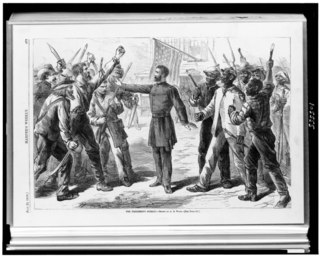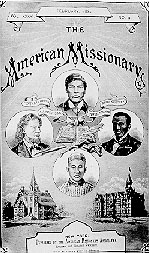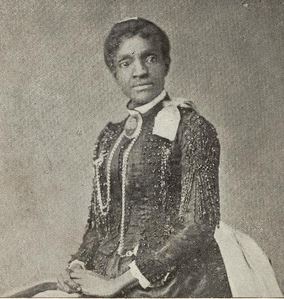
The Reconstruction era was a period in United States history and Southern United States history that followed the American Civil War and was dominated by the legal, social, and political challenges of the abolition of slavery and the reintegration of the eleven former Confederate States of America into the United States. During this period, three amendments were added to the United States Constitution to grant citizenship and equal civil rights to the newly freed slaves. To circumvent these legal achievements, the former Confederate states imposed poll taxes and literacy tests and engaged in terrorism to intimidate and control people of color and to discourage or prevent them from voting.

The Bureau of Refugees, Freedmen, and Abandoned Lands, usually referred to as simply the Freedmen's Bureau, was a U.S. government agency of early post American Civil War Reconstruction, assisting freedmen in the South. It was established on March 3, 1865, and operated briefly as a federal agency after the War, from 1865 to 1872, to direct "provisions, clothing, and fuel... for the immediate and temporary shelter and supply of destitute and suffering refugees and freedmen and their wives and children".

The New Orleans Massacre of 1866 occurred on July 30, when a peaceful demonstration of mostly Black Freedmen was set upon by a mob of white rioters, many of whom had been soldiers of the recently defeated Confederate States of America, leading to a full-scale massacre. The violence erupted outside the Mechanics Institute, site of a reconvened Louisiana Constitutional Convention. According to the official report, a total of 38 were killed and 146 wounded, of whom 34 dead and 119 wounded were Black Freedmen. Unofficial estimates were higher. Gilles Vandal estimated 40 to 50 Black Americans were killed and more than 150 Black Americans wounded. Others have claimed nearly 200 were killed. In addition, three white convention attendees were killed, as was one white protester.

The American Missionary Association (AMA) was a Protestant-based abolitionist group founded on September 3, 1846 in Albany, New York. The main purpose of the organization was abolition of slavery, education of African Americans, promotion of racial equality, and spreading Christian values. Its members and leaders were of both races; The Association was chiefly sponsored by the Congregationalist churches in New England. The main goals were to abolish slavery, provide education to African Americans, and promote racial equality for free Blacks. The AMA played a significant role in several key historical events and movements, including the Civil War, Reconstruction, and the Civil Rights Movement.

Contraband was a term commonly used in the US military during the American Civil War to describe a new status for certain people who escaped slavery or those who affiliated with Union forces. In August 1861, the Union Army and the US Congress determined that the US would no longer return people who escaped slavery who went to Union lines, but they would be classified as "contraband of war," or captured enemy property. They used many as laborers to support Union efforts and soon began to pay wages.

John Edward Bouligny was an American politician who was a member of the U.S. House of Representatives representing the state of Louisiana. He served one term as a member of the Know Nothing movement's anti-immigrant American Party. During his term, Louisiana seceded from the Union, but Bouligny remained in Washington and refused to resign. He was the only member of Congress from Louisiana to not resign or vacate his seat after the state seceded.
In the United States, a freedmen's town was an African American municipality or community built by freedmen, formerly enslaved people who were emancipated during and after the American Civil War. These towns emerged in a number of states, most notably Texas. They are also known as freedom colonies, from the title of a book by Sitton and Conrad.

The Freedmen's Bureau bills provided legislative authorization for the Freedmen's Bureau, which was set up by U.S. President Abraham Lincoln in 1865 as part of the United States Army. Following the original bill in 1865, subsequent bills sought to extend its authority and lifespan. Andrew Johnson tried to derail the bill's intention to aid freed slaves during his presidency.

George Michael Decker Hahn, was an attorney, politician, publisher and planter in New Orleans, Louisiana. He served twice in Congress during two widely separated periods, elected first as a Unionist to the U.S. House of Representatives in 1862, as a Republican to the U.S. Senate in 1865, and later as a Republican to the U.S. House of Representatives in 1884. He was elected as the 19th Governor of Louisiana, serving from 1864 to 1865 during the American Civil War, when the state was occupied by Union troops. He was the first German-born governor in the United States, and is also claimed as the first ethnic Jewish governor. By that time, he was a practicing Episcopalian.

Benjamin Franklin Flanders was a teacher, politician and planter in New Orleans, Louisiana. In 1867, he was appointed by the military commander as the 21st Governor of Louisiana during Reconstruction, a position which he held for some six months. He was the second and, as of 2024, the last Republican mayor of New Orleans, Louisiana.

This is a selected bibliography of the main scholarly books and articles of Reconstruction, the period after the American Civil War, 1863–1877.

Edward Henry Durell was the 25th mayor of New Orleans, Louisiana and a United States district judge of the United States District Court for the District of Louisiana and the United States District Court for the Eastern District of Louisiana.

George Thompson Ruby was an African-American Republican politician in Reconstruction-era Texas. Born in New York to African-American businessman Reuben Ruby and Rachel Humphey and raised in Portland, Maine, he worked in Boston and Haiti before starting teaching in New Orleans before the end of the American Civil War.
George H. Hanks was an abolitionist and civil rights activist and colonel in the US Civil War.

Nellie A. Ramsey Leslie was notable as a teacher, musician and composer, working in Louisiana and Mississippi, and then in Indian Territory and Corpus Christi, Texas, where she founded a musical conservatory for girls. Born into slavery in Virginia, after emancipation she gained schooling in Ohio and moved to Louisiana to teach for the Freedmen's Bureau. She attended the Normal School of Straight University and gained further training as a teacher. Teaching in Louisiana, Mississippi, Indian Territory, and Texas, Leslie educated freedmen and their children.
Reverend Thomas W. Conway was assistant commissioner of the Freedmen Bureau in Alabama and Louisiana during the Reconstruction era that followed the American Civil War. Freedmen's Bureau activities in Louisiana began on June 13, 1865 when the Bureau's commissioner, Oliver O. Howard, appointed Chaplain Thomas W. Conway as the state's assistant commissioner. He published a report for that year, The Freedmen of Louisiana: Final Report of the Bureau of Free Labor, Department of the Gulf, to Major General Canby, Commanding (1865). Another seven assistant commissioners would later hold this office.
Gilbert Academy was a premier preparatory school for African-American high school students in New Orleans, Louisiana. Begun in 1863 in New Orleans as a home for colored children orphaned by the American Civil War, the home moved to Baldwin, Louisiana, in 1867. The Orphans Home evolved into a school and, over the next 80 years, became Gilbert Academy, a college preparatory school for African Americans. Gilbert Academy returned to New Orleans, achieved accreditation by the Southern Association of Secondary Schools and Colleges, and graduated many notable students until it closed in 1949.
James Henri Burch, often written as J. Henri Burch, was an African American state legislator in Louisiana during Reconstruction, the years after the Civil War. He represented East Baton Rouge Parish in both the state's House of Representatives and Senate and was an important Black political leader in the period.
Abraham Lincoln Davis Jr. was an American minister and leader in the civil rights movement. He led voting drives and advocated for desegregation in New Orleans, Louisiana. In 1975, Davis became the first African American member of the New Orleans City Council since the Reconstruction era.

Jabez Bullock Blanding, called Lt. J. B. Blanding in most reports about his death, was a disabled combat veteran of the American Civil War and an agent of the Freedmen's Bureau in the United States who was assassinated by white Mississippians in Grenada, Yalobusha County in April 1866. Blanding was shot three times while on an evening walk. There is a 50-page file on the murder of Blanding in the records of the Freedmen's Bureau; the gunman was likely "Young" Tom Wilson, aided and abetted by local gang leader Bill Forrest. No one was ever charged with Blanding's murder, in part due to witness intimidation.














